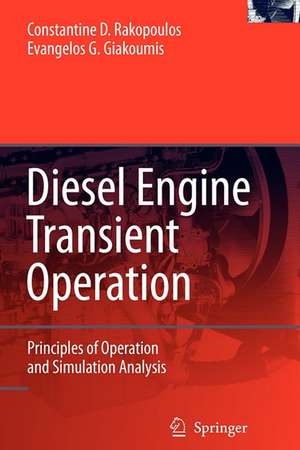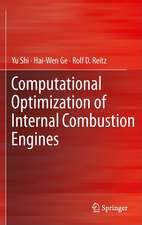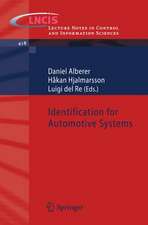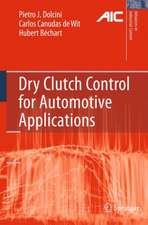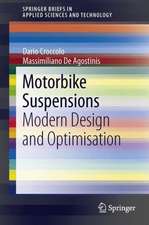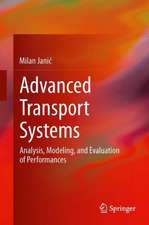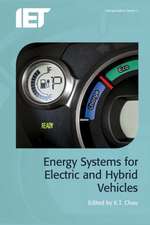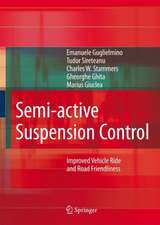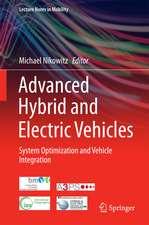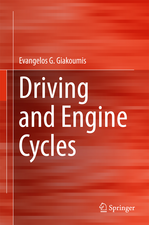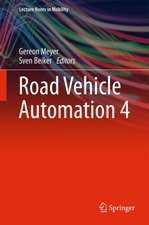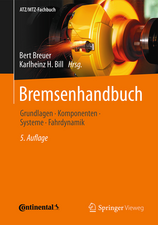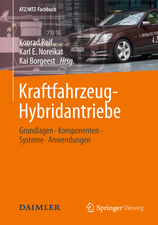Diesel Engine Transient Operation: Principles of Operation and Simulation Analysis
Autor Constantine D. Rakopoulos, Evangelos G. Giakoumisen Limba Engleză Paperback – 13 oct 2010
| Toate formatele și edițiile | Preț | Express |
|---|---|---|
| Paperback (1) | 950.03 lei 6-8 săpt. | |
| SPRINGER LONDON – 13 oct 2010 | 950.03 lei 6-8 săpt. | |
| Hardback (1) | 958.38 lei 6-8 săpt. | |
| SPRINGER LONDON – 27 mar 2009 | 958.38 lei 6-8 săpt. |
Preț: 950.03 lei
Preț vechi: 1158.57 lei
-18% Nou
Puncte Express: 1425
Preț estimativ în valută:
181.79€ • 194.39$ • 151.57£
181.79€ • 194.39$ • 151.57£
Carte tipărită la comandă
Livrare economică 18 aprilie-02 mai
Preluare comenzi: 021 569.72.76
Specificații
ISBN-13: 9781849968409
ISBN-10: 1849968403
Pagini: 390
Ilustrații: XX, 390 p.
Dimensiuni: 155 x 235 x 21 mm
Greutate: 0.58 kg
Ediția:2009
Editura: SPRINGER LONDON
Colecția Springer
Locul publicării:London, United Kingdom
ISBN-10: 1849968403
Pagini: 390
Ilustrații: XX, 390 p.
Dimensiuni: 155 x 235 x 21 mm
Greutate: 0.58 kg
Ediția:2009
Editura: SPRINGER LONDON
Colecția Springer
Locul publicării:London, United Kingdom
Public țintă
ResearchCuprins
Transient Operation Fundamentals.- Thermodynamic Aspects of Transient Operation.- Dynamics.- Experimental Measurements.- Emissions.- Methods of Improving Transient Response.- Special Cases of Transient Operation.- Second-law Analysis.- Modeling.
Notă biografică
Professor Constantine D. Rakopoulos is Head of the Thermal Engineering Department and Director of the I.C. Engines Laboratory at the National Technical University of Athens (NTUA), Greece. He graduated with a Dipl.Ing. from the NTUA, but obtained his Ph.D. from the Imperial College of Science, Technology and Medicine, University of London, UK. Over the last 25 years he has been responsible for the development of engines research at the NTUA and has over 130 refereed papers in international journals and conferences. Professor Rakopoulos has guest-edited special issues in international journals and co-organised international conferences, including ECOS 2006.
Dr. Evangelos G. Giakoumis gained his Dr.Ing. from the School of Mechanical Engineering at the NTUA, before working as Area Manager at the After-Sales Department of the Peugeot Automobiles Distributor in Greece. He has been recently elected Lecturer at the Thermal Engineering Department of the School of Mechanical Engineering of the NTUA. Dr. Giakoumis' research interests include diesel engine experimental and simulation analysis under transient conditions, and second-law analysis of internal combustion engines.
Dr. Evangelos G. Giakoumis gained his Dr.Ing. from the School of Mechanical Engineering at the NTUA, before working as Area Manager at the After-Sales Department of the Peugeot Automobiles Distributor in Greece. He has been recently elected Lecturer at the Thermal Engineering Department of the School of Mechanical Engineering of the NTUA. Dr. Giakoumis' research interests include diesel engine experimental and simulation analysis under transient conditions, and second-law analysis of internal combustion engines.
Textul de pe ultima copertă
Traditionally, the study of internal combustion engines has focused on the steady-state performance. However, the daily driving schedule of automotive and truck engines is inherently related to unsteady operation, whereas the most critical conditions encountered by industrial or marine engines are met during transients. Unfortunately, the transient operation of turbocharged diesel engines has been associated with poor driveability, as well as overshoot in particulate and gaseous emissions, making the study and modeling of transient engine operation an important scientific objective.
Diesel Engine Transient Operation provides an in-depth discussion of all the complex thermodynamic and dynamic phenomena that are experienced by a diesel engine during load increase, acceleration, cold starting or Transient Cycle. Beginning with the fundamental and most influential turbocharger lag problem, the analysis covers a range of topics, including heat transfer, combustion, air-supply and friction.
Diesel Engine Transient Operation presents the most important findings in the field, with special attention paid to the discussion of exhaust emission mechanisms and to the various methods of improving transient response. Moreover, the discussion of the main experimental techniques covers the measurement of exhaust emissions and particle size distribution, which has gained increasing interest in recent years due to stringent regulations imposed by the EU, USA, and Japan.
Researchers and students in the field will find this book’s comprehensive coverage of the latest research particularly informative, and will also appreciate the authors’ analysis of available modeling techniques.
Diesel Engine Transient Operation provides an in-depth discussion of all the complex thermodynamic and dynamic phenomena that are experienced by a diesel engine during load increase, acceleration, cold starting or Transient Cycle. Beginning with the fundamental and most influential turbocharger lag problem, the analysis covers a range of topics, including heat transfer, combustion, air-supply and friction.
Diesel Engine Transient Operation presents the most important findings in the field, with special attention paid to the discussion of exhaust emission mechanisms and to the various methods of improving transient response. Moreover, the discussion of the main experimental techniques covers the measurement of exhaust emissions and particle size distribution, which has gained increasing interest in recent years due to stringent regulations imposed by the EU, USA, and Japan.
Researchers and students in the field will find this book’s comprehensive coverage of the latest research particularly informative, and will also appreciate the authors’ analysis of available modeling techniques.
Caracteristici
Presents the most important findings in the field of Compression Ignition (Diesel) engine simulation from the past 30 years Includes supplementary material: sn.pub/extras
